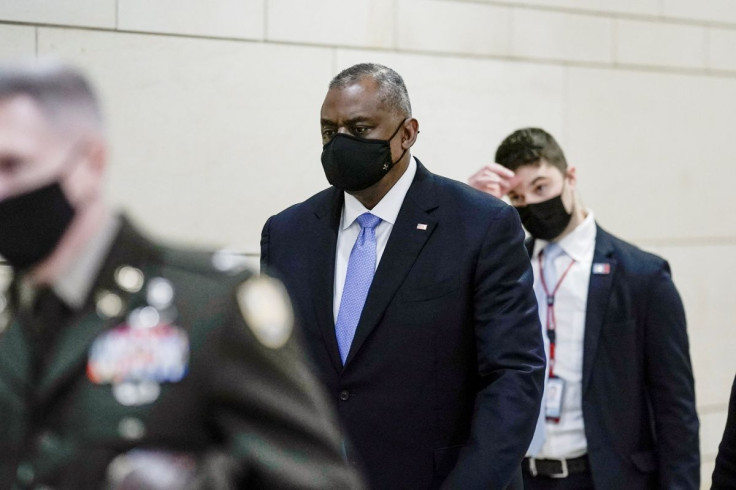U.S. Defense Secretary Heads To Europe For NATO Talks, Visit Troops

U.S. Defense Secretary Lloyd Austin heads to Brussels on Tuesday for talks with NATO allies and to visit U.S. troops in Poland as Washington remains focused on the risk of a large-scale Russian invasion of Ukraine.
Austin's departure came as Russia said some of its military units were returning to their bases after exercises near Ukraine. It was unclear how many units were being withdrawn, and by what distance.
U.S. officials, speaking on condition of anonymity, did not immediately comment on the Russian statements. Earlier they had reiterated their concerns over Moscow's buildup of an estimated 130,000 troops to the north, east and south of Ukraine.
"We have consistently presented a path of diplomacy and we have consistently been disappointed by Russia's interest in engaging substantively. So I will not tell you that I am optimistic at this point," a senior U.S. defense official said.
While it denies plans to invade Ukraine, Moscow has said it could take unspecified "military-technical" action unless a series of demands are met, including promises from NATO never to admit Ukraine and to withdraw forces from Eastern Europe.
NATO MEETING
NATO defence ministers will meet on Wednesday and Thursday and are expected to set in motion a plan that could establish four multi-national battlegroups in southeastern Europe in response to Russia's military build-up in Ukraine, three diplomats told Reuters.
The move would be NATO's biggest shift in force posture since it set up its "Enhanced Forward Presence" battlegroups in Estonia, Lithuania, Latvia and Poland - backed by tanks, air defences and intelligence and surveillance units - in response to Russia's annexation of Crimea in 2014.
Ukraine is not a NATO member and the alliance is under no treaty obligation to defend it. President Joe Biden's administration has also stressed that U.S. troops will not fight nuclear-armed Russia and he has withdrawn U.S. military trainers from Ukraine.
However, Biden is sending additional U.S. troops to Europe, including to Poland, where Austin is scheduled to meet Polish leaders. He will also meet U.S. and Polish forces at Powidz Air Base later this week.
Austin will also travel to Lithuania, which has supplied Ukraine with Stinger anti-aircraft missile systems and ammunition.
Ukraine has bolstered its armed forces with weapons from allies, including U.S. and British anti-tank systems and Turkish drones, but U.S. officials say Russia clearly retains "overwhelming" military superiority.
"The Ukrainians absolutely have the will to fight," the senior U.S. official said. "But at the same time, what the Russians could bring to bear is quite overwhelming."
© Copyright Thomson Reuters 2024. All rights reserved.





















